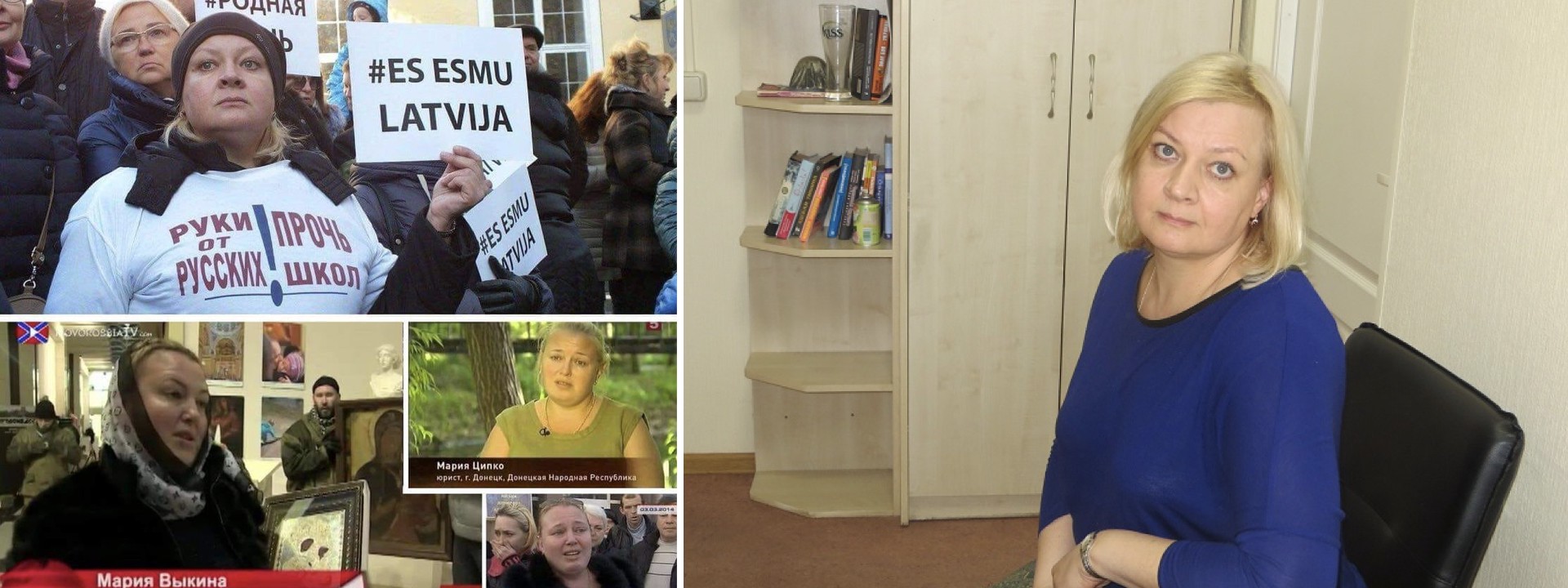#BalticBrief: Cipko Not Seen in Latvia
Sighting of notorious pro-Kremlin impersonator in Latvia proved false
#BalticBrief: Cipko Not Seen in Latvia

Sighting of notorious pro-Kremlin impersonator in Latvia proved false

On April 4, the Russian language community in Latvia joined in yet another rally to protest education reform to have so called “Russian schools” teach more in Latvian. The first of such protests took place in October 2017. This time the protest was called “Rally of Angry Parents” (Марш рассерженных родителей). The protesters aimed to show disappointment in the decision of the Latvian president Raimonds Vejonis, who ratified the reform on April 2.
A day before the protest Denys Bihunov, a Ukrainian journalist working for a local media in the city of Slovyansk, posted on Facebook a photo compilation suggesting that Maria Cipko appeared in a Russian language community protest in Riga.

Maria is a well-known pro-Kremlin personality, who impersonates various iterations of anti-Ukrainian citizens on Russian television news stories. According to StopFake.org, a website that publishes debunks of disinformation about Ukraine, Maria Cipko played the role of an organizer of a referendum on Luhansk and Donetsk exciting Ukraine in May 2014. Later in June 2014, she appeared on Russian TV channel as a relative of an activist who suffered during the fire in Odessa on May 2. In August 2014, StopFake.org spotted her playing a lawyer from Donetsk. Acting in her role, she told the story of how Ukrainian soldiers shot dead a family of a rebel in Kramatorsk, Donetsk. In December 2014, Cipko played the role of the deputy director of an Orthodox Christian fund in Donetsk.
Given Cipko’s notoriety across the Ukrainian audience, Bihunov’s post garnered almost four thousand shares, over six hundred likes, and over one hundred comments. However, the first comment liked by 14 Facebook users read:
“Not her.”
Was Cipko, in fact, playing a new role at protests on the polarizing topic of Russian language education in Latvia?
The comment, as well as the timing of Bihunov’s post, suggested that the image was taken from a different protest that took place in Riga at a time prior.
Nevertheless, the news spread.
The same day, a pro-Ukraine Twitter account in Latvia tweeted the photo compilation with an accompanying text “TOURISTS”.

The original tweet was deleted, but a cached version suggested that it garnered at least 234 retweets, 257 likes, and 14 comments.
It was used as a source by the Twitter account of Kyiv Post editor Euan McDonald, whose tweet was then used by the map-based news resource Liveuamap.com.
Two days later, on April 5, the Latvian media outlet NRA.lv republished a news article by Latvian news agency LETA, which got in touch with Latvian Security Police. The article read:
The Security Police assured LETA that in its assessment there is currently no reason to believe that the information disseminated in social networks about a person who is likely to take part in protest actions not only in Latvia, but also in Ukraine and other countries, is true.
The Ukrainian press did not share the same opinion. On April 6, Ukrainian media outlet Ostrov published an unsourced article titled “Provocateur Cipko, who played many roles ‘offended by the junta’ in Ukraine, now assures that she is Latvia.” The same day the news with a reference to Ostrov were spread by other Ukrainian media outlets like Obozrevatel, and Gordon, later by Ukrainian Vso pro Vso, and Russian media outlet Ekho Moskvy.
Gordon used another image of the same woman in Riga in an article about the alleged Cipko spotting. The article mentioned that it was taken during the protest in Riga on October 23, 2017, and published by the Latvian media outlet Delfi.lv. Nevertheless, the caption of the image on Gordon claimed that it was Cipko at the protest.

Overall, the Google search gave 70 results that mentioned the keywords “Maria Cipko in Latvia” from April 3 to April 12.
Russian language media outlet in Latvia Press.lv debunked the claim widely shared by Ukrainian media in its publication on April 6. Moreover, the journalists found the woman on the picture in Latvia. According to Press.lv, it was Svetlana Prokofieva from Riga. The picture used in the publication was allegedly taken in the newsroom.

Though the origin of the false claim was first made by the Ukrainian journalist and widely shared by pro-Ukrainian media, the title of the article blamed Latvian media outlets in spreading the false information. The titles used by Press.lv and the Latvian pro-Kremlin media outlet Vesti.lv, which @DFRLab has reported about before, read:

In addition to the NRA and LETA article mentioned before, the topic was covered by a conservative Latvian news outlet LA.lv. This article also cited the Security Police saying that there is no reason to believe that the person on the photo-compilation is the same.
@DFRLab did not identify other Latvian media outlets reporting about the accusations against Cipko.
Conclusion
The false accusations of the appearance of Maria Cipko in Riga was first spread on Facebook by the Ukrainian journalist and then amplified by pro-Ukrainian media outlets, blogs, and social media accounts.
The Russian language media in Latvia debunked the claim and found the true identity of the protestor in Riga, but blamed Latvian media for spreading disinformation. @DFRLab did not identify any article on Latvian mainstream media that claimed that Maria Cipko being spotted in Riga was true.
Follow along for more in-depth analysis from our #DigitalSherlocks.

